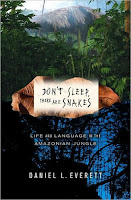 Lately, I’ve been becoming increasingly interested in off-grid living; relying as little as possible on public and government programs and funds to support oneself. With this in mind, reading Don’t Sleep There are Snakes has been enjoyable and thought provoking. Author and linguist Daniel Everett has been regularly spending time with the Pirahã population of the Amazon since the 1970’s. This book, discusses not only the linguistic implications of what has been learned from Everett’s work, but also the lifestyle and values of the people being studied. Of course, the reader will see that the culture of the Pirahã is crucial to the linguistic conclusions that Everett has drawn, but even if it weren’t, it’s just so darn interesting.
Lately, I’ve been becoming increasingly interested in off-grid living; relying as little as possible on public and government programs and funds to support oneself. With this in mind, reading Don’t Sleep There are Snakes has been enjoyable and thought provoking. Author and linguist Daniel Everett has been regularly spending time with the Pirahã population of the Amazon since the 1970’s. This book, discusses not only the linguistic implications of what has been learned from Everett’s work, but also the lifestyle and values of the people being studied. Of course, the reader will see that the culture of the Pirahã is crucial to the linguistic conclusions that Everett has drawn, but even if it weren’t, it’s just so darn interesting.Since I’m not an expert in linguistics (and one doesn’t have to be to enjoy this book), I’ll have to take Everett’s word for it when he writes that his conclusions are controversial and unusual. Instead I’m inclined to focus on the lifestyle and the anecdotes that illustrate their personalities. After reading this book, I’m impressed with the comfort and contentedness that the Amazonian people have in their lives. They have certainly achieved something that I can only hope to attain.
A favorite passage from the book:
They [the Pirahãs] have no craving for truth as a transcendental reality. Indeed, the concept has no place in their values. Truth to the Pirahãs is catching a fish, rowing a canoe, laughing with your children, loving your brother, dying of malaria. Does this make them more primitive? Many anthropologists have suggested so, which is why they are so concerned about finding out the Pirahãs’ notions about God, the world, and creation.
But there is an interesting alternative way to think about things. Perhaps it is the presence of these concerns that makes a culture more primitive, and their absence that renders a culture more sophisticated. If that is true, the Pirahãs are a very sophisticated people. Does this sound far-fetched? Let’s ask ourselves if it is more sophisticated to look at the universe with worry, concern, and a belief that we can understand it all, or to enjoy life as it comes, recognizing the likely futility of looking for truth or God?
In Conclusion, it is a wonderful book, one that I certainly recommend.
